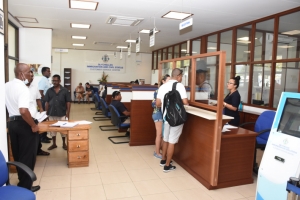President Danny Faure hosts third consultative meeting with government and private sector stakeholders
Employment policies and GOP procedures discussed
Relief schemes being implemented to reduce the economic impacts of COVID-19 on businesses, employment policies, procedures for gainful occupation permits are some of the topics discussed during yesterday’s third consultative session.
President Danny Faure chaired the session with key representatives of government and private sector stakeholders at State House.
The meeting follows on from sessions previously held between the two sectors regarding the economic response to COVID-19.
Oliver Bastienne, chairman of the Seychelles Chamber of Commerce and Industry (SCCI), noted that the private sector further expressed its frustrations in regards to the financial assistance scheme for employees.
Mr Bastienne stressed that the procedures regarding this scheme needs to be reviewed in order to lessen the confusion and desperation felt by many businesses that were waiting for approval.
Aside from the salary payments for private sector, Mr Bastienne said that the meeting was an opportunity to share the feedback from businesses on the subject of the Central Bank of Seychelles’ relief scheme.
The Central Bank of Seychelles (CBS) committed a credit line of R500 million for businesses impacted by COVID-19 with a lending rate of 1.5%, to be paid over the course of three years.
The private sector yesterday raised points concerning the collaterals attached to this scheme and requested that the CBS look into extending the three-year payment plan for the loans.
Discussions also explored possibilities of setting up yet another scheme, this one geared towards assisting micro and small enterprises.
“This is to ensure that they get captured along the way because many of them have financial and non-financial limitations. It is important that they are supported during this difficult time,” Mr Bastienne stated.
He further noted that the meeting participants deliberated on procedures for GOP, during which private sector expressed concerns that the country “still has fundamental problem of labour shortage, both in terms of quantity and skills set”.
On her part the chairperson of the Seychelles Hotel and Tourism Association (SHTA), Sybille Cardon, noted that these consultative meetings have been productive, although there is more work still to be done.
“I’m pleased to note how the government has engaged the private sector in these discussions to come up with a consensus that will benefit both employees and employers,” she noted.
In regards to the delay in salary payments under the Financial Assistance for Job Retention (FA4JR), she added: “We have talked with the minister [for finance] and he acknowledged that the procedures initially used were not that effective.”
“He realises that some people have not been paid for April and are now waiting for their May salary. He has promised that everyone will be paid their April salary, even their May salary, by the end of this week.”
Antoine Robinson, who looks at workers’ welfare as secretary general of the Seychelles Federation of Workers’ Union (SFWU), noted that employees will have to be informed on how the financial schemes operate.
Also present for the meeting at State House, were the Minister for Finance, Trade, Investment & Economic Planning, Ambassador Maurice Loustau-Lalanne; Minister for Employment, Immigration and Civil Status, Miriam Telemaque; Attorney General Frank Ally; principal secretary for employment Jules Baker; principal secretary for immigration Alain Volcere, principal secretary for finance Damien Thesee, special advisor for employment Veronique Bresson; CBS Governor Caroline Abel; CBS’ first deputy governor Christopher Edmond; chief policy analyst for department of employment, Susan Morel; GETUS (General Employers Trade Union of Seychelles) executive secretary Tina Hoarau; SHTA vice-chairperson Allen Mason; SCCI treasurer Brenda Morin; Praslin Business Association representative Paul Rouillon; SCCI representative Divino Sabino; and La Digue Business Association representative Melton Ernesta.
Elsie Pointe
Seychellois workers to get their salaries until end of December 2020
Seychellois employees will not lose out on their salaries after June 2020, now that government has guaranteed to continue paying their salaries from July to end of December 2020.
It was the Minister for Finance, Trade, Investment and Economic Planning, Ambassador Maurice Loustau-Lalanne, who made the announcement with the press yesterday, following a second round of meeting chaired by President Danny Faure with key stakeholders on pertinent employment-related matters until June 2020 and beyond, as a result of the COVID-19 pandemic. Expatriate workers will not be included for salary retention as from July.
The Financial Assistance for Job Retention (FA4JR) scheme set up by government guarantees salary payments for employees and self-employed individuals, for both local and expatriates, from April to end of June 2020.
“With regard to the financial assistance for salaries, the decision of government is that it will continue the same scheme from July 1 right through to December 31, 2020. But as from July 1, the payment of salaries will be only to Seychellois workers and not expatriates,” Minister Loustau- Lalanne said, noting that those workers being made redundant will also be paid their salaries every month until end of December 2020.
Minister Loustau-Lalanne said that further to securing of their salaries, those made redundant will be placed on a scheme, which will include re-training, so as to be able to do other jobs. Details of the scheme will be announced later.
“We will not be paying somebody to stay at home. In this time of crisis when government is securing their salaries, he or she must be prepared to do any work to be requested from them that will continue to keep the economy moving,” Minister Loustau-Lalanne said, noting that the R1.90 billion approved budget is enough to cover Seychellois workers’ salaries until end of December 2020.
He noted that companies that were not assisted under FA4JR scheme in the April applications, their employees will as from July 1 onwards, be also assisted with salary payments.
Apart from President Faure, Minister Loustau-Lalanne, the private sector and trade unions, the meeting at State House yesterday morning was also attended by the Minister for Employment, Immigration and Civil Status Myriam Telemaque, the Minster for Tourism, Civil Aviation, Ports & Marine Didier Dogley, Attorney General Frank Ally and other top officials from the employment department.
Minister Loustau-Lalanne claimed the second round of negotiation, which follows the first round held last Saturday between government and the private sector in relation to financial assistance and Gainful Occupation Permit (GOP) – work permit – was very fruitful.
He said that three main decisions were taken during the meeting, with two of the decisions to be discussed further on Tuesday next week along with the involvement of the Governor of the Central Bank of Seychelles (CBS), Caroline Abel.
Minister Loustau-Lalanne stated that as employers have voiced concerns that government is providing assistance only to employees and haven’t really looked at a scheme to support businesses, the private sector had wanted to see some assistance to be provided or that could be provided by the government, to businesses directly.
He noted though that government’s decision to support businesses is through a loan scheme mechanism worth R500 million with CBS and issues raised by the employers have prompted further discussion in relation to the loan scheme.
In relation to GOP, also to be finalised next Tuesday, Minister Loustau-Lalanne said that the private sector were concerned that when they will make their expatriate staff redundant and they go away, they will never get their post back.
Minister Loustau-Lalanne stated that to alleviate the situation in making available existing expatriate workers in the country for business continuity, the government has taken the decision to facilitate the extension of GOPs for the 4000 plus expatriate workers whose GOP expires between April and June 2020.
He noted that this will be based on requests made by the businesses.
He stated the 6000 plus out of the country will not be allowed to enter and their GOPs have been terminated.
“The point I want to make is that, if they are able to start the negotiation procedures to make their staff redundant, the responsibility to pay compensation to the staff that are being made redundant rests entirely with the businesses,” Minister Loustau-Lalanne said, noting the business owners have to take responsibility towards their businesses.
He encouraged workers who would be affected to take on job opportunities available even though not in their related and respective fields.
He commended the hotel workers, among other tourism workers, who responded to jobs advertised by the Indian Ocean Tuna Ltd (IOT).
For his part, the principal secretary for employment, Jules Baker, reminded the employees that will be lucky to have not been made redundant and will be receiving their salaries from government though they will be staying at home, to make it their responsibility to come down to work when requested.
He claimed that the department has up to now recorded 20 redundancy applications by businesses.
He also called on those to be made redundant and will still be paid their salaries, to make it their duty to come to work when asked to even though not in their line of duty.
The secretary-general of the Seychelles Federations of Workers Union (SFWU), Antoine Robinson, said it was encouraging to see that the situation for the time being in this time of crisis reflected a win-win situation for both employers and employees.
He noted that while being guaranteed their salaries, the workers must at all cost be prepared to work as there is no such thing as ‘a free lunch’.
On behalf of the private sector, Sybille Cardon from the Seychelles Hotel and Tourism Association (SHTA) said she was happy with the outcome, although she did not elaborate further.
Assembly approves employment amendments
Debate on the Employment Amendment Bill, 2020 resumed yesterday following an adjournment on debate last week following which several consultative meetings have been held with various concerned stakeholders including employers in different sectors and workers’ union representative to reach a consensus that would address the concerns of both employees and employers.
Following those, a series of proposed amendments were submitted to the Assembly for debate in committee stage yesterday.
Debates in the committee stage ended after 8pm when 20 members voted in favour of the bill as amended and nobody against.
The Minister for Employment, Immigration and Civil Status, Myriam Telemaque, principal secretary for employment Jules Baker, Attorney General Frank Ally were all present in the Assembly to discuss the amendments.
The Assembly continues its sessions today during which several other Bills will be considered.
Marie-Anne Lepathy
Stakeholders achieve general consensus on employment act
Allowing negotiation procedures to take place between employers and employees on payment of wages and the reduction of wages, including procedures also to make a Seychellois worker redundant before June 30, 2020, but effective as from July 1, 2020, was part of a general consensus reached yesterday between government, the National Assembly, the private sector and trade unions.
The half-day consultation meeting organised by the National Assembly was held at the Seychelles Trading Company (STC) conference room in the presence of the leader of the opposition, Wavel Ramkalawan, leader of government business, Charles De Comarmond and deputy Speaker Ahmed Afif.
Apart from other members of the National Assembly, top officials from the employment department, the Seychelles Chamber of Commerce and Industry (SCCI) and the civil society, the Praslin and La Digue business community were also present among other private sector stakeholders
It follows a series of meetings by government with the private sector and trade unions to discuss on an amendment to the Employment Act 1995 aimed at protecting workers’ employment from the impact of the coronavirus (COVID-19) pandemic until June 30, 2020. President Danny Faure also chaired one such meeting at State House on Saturday.
It was the National Assembly who adjourned a debate last week, until further negotiation on the bill proposed by the executive to protect the employees. The amendment brought in by government through the Minister of Employment, Immigration and Civil Status, Myriam Telemaque, sought to prohibit the deferment of payment of wages or the reduction of wages of an employee without the approval of a competent officer from the employment department.
It also prohibits an employer to initiate negotiation procedures to make their Seychellois worker redundant until June 30, 2020, when the Financial Assistance for the Job Retention (FA4JR) scheme, which guarantees salary payments for employees and self-employed individuals, ends. The National assembly, in majority, was strongly against the amendments citing that it was in favour of the employees over private sector employers, the job creators. The amendment though, is not applicable to expatriate workers who can be made redundant during this period.
The consultation meeting was conducted by a panel led by Hon. Bernard Georges, who is also the chairman of the Bills Committee in the National Assembly, along with the principal secretary for Employment, Jules Baker, Attorney General Frank Ally, Antoine Robinson from the Seychelles Workers Federation Union and business consultant Peter Roselie.
Hon. Jean François Ferrari, who brought a motion to adjourn the assembly debate on the amendment last week, and who was host to the meeting, said that the aim of the meeting was to consult and seek a solution to make the bill acceptable and workable for both parties.
He noted that the assembly is only seeking for employers, especially those who have not been assisted under the FA4JR scheme, to regain the freedom to initiate negotiations with their employees on redundancies, layoffs, salary cuts among other issues.
He said that for the majority in the National Assembly and also in an effort to save jobs and employment, it was imperatively necessary to sustain those who create jobs and employment.
Speaking on two propositions Hon. Georges said the National Assembly wanted to see the go ahead negotiations on salary deferment or cuts by the employers and the employees but in the presence of a competent officer from the employment department. He further said that this will guarantee the oversight that government was looking for.
He noted that the proposition by the National Assembly is temporary during this transition crisis of the post COVID-19 and further to the country coming back to normal, the employers and employees will as before negotiate without having to go through a competent officer.
In the second proposition, Hon. Georges said that as not all businesses have been assisted under the FA4JR scheme, it is fitting to allow them some flexibility to start negotiations with their employees with immediate effect until end of June of which its implementation will start in July.
He claimed that both the employers and the employees will feel protected under the two propositions.
Most of the interventions wanted the bill to be scrapped and leave the original act as it is, citing that it was already guaranteeing negotiations between employers and employees.
PS Baker and Mr Robinson reminded, while accepting those propositions, it all boils down to achieving a balance between the rights and interests of both employees and employers, while still bearing in mind that the employees have less bargaining power than employers. They claimed the employees need to be protected against arbitrary decisions.
The consultative discussion yesterday was ahead of the Minister for Employment’s reappearance in the National Assembly today for continued debate on the amendment further to yesterday’s outcome.
Patrick Joubert
Stakeholders discuss employment post-June, post Covid-19
President Danny Faure on Saturday chaired the first meeting with key stakeholders concerned with employment-related matters as a result of the COVID-19 pandemic.
The meet, held at State House, was attended by Attorney General Frank Ally, Minister for Employment, Immigration and Civil Status Myriam Telemaque, secretary-general of the Seychelles Federation Workers Union (SFWU) Antoine Robinson and representatives of the private sector.
Its aim was to bring together different stakeholders to strategise on the way forward as from the end of June, when the Financial Assistance for Job Retention (FA4JR) scheme, which guarantees salary payments for employees and self-employed individuals, comes to a halt.
Furthermore, the meeting presented an opportunity for stakeholders from both government and the private sector to come together to discuss and work out possible amendments proposed to the Employment Act, ahead of the Ministry of Employment’s reappearance in the National Assembly this week, after members last week voted to adjourn debate on the proposed amendments and strongly contended the amendments as favouring employees over private sector employers.
Special advisor to the Minister for Employment, Veronique Bresson, noted that the meeting is but the first in a series of meetings until a strategy is finalised to address employment related matters.
She noted that the bill which was last week deferred by the National Assembly prompted the ministry to hold consultations with both employees and employers so as to come to a consensus and a modified version will be tabled before the assembly on Tuesday.
“For the first time in many years, our employment situation is reversed. We have always had more job opportunities that persons seeking jobs but now things are reversed. Now we have more persons seeking jobs than there are jobs on the market,” Ms Bresson noted.
“There are certain arrangements which are being discussed but things look positive and the government is serious about the current situation in the country. President Danny Faure has made that clear. It comes down to achieving a balance between the rights and interests of employees and those of employers, while being mindful that the employee has less bargaining power than employers. Government’s role is to ensure that this balance is maintained so in future we do not find ourselves in a situation where in terms of the economy, our economy worsens,” Ms Bresson stated, noting the government’s commitment to ensuring as many people as possible are in employment.
Representatives furthering workers’ rights and those of the private sector also echoed similar sentiments that the meeting was indeed fruitful and geared towards solutions that respect the rights and interests of both parties.
“I believe the positions of all the parties have been made clear before and the key element here is pertaining to the discussion which is centred around fairness, respect, balance, respecting of rights and all these elements are being discussed, in looking at the national agenda, which is the most pertinent aspect,” stated the chairperson of the Seychelles Chamber of Commerce and Industry, Oliver Bastienne.
Among some points of discussion were whether hard-hit sectors such as tourism would be able to afford to pay employees post June, as it looks unlikely that the travel industry will bounce back in the wake of the pandemic.
The second meeting with President Faure is scheduled for Thursday.
Laura Pillay
Government to discuss proposed consensus on amendment to Employment Act 1995
After the National Assembly voted on Tuesday this week to adjourn debate until further negotiation on an amendment to the Employment Act 1995, proposed by the executive to protect employees following the impact of COVID-19, the department of employment has held three meetings with the private sector, trade unions and stakeholders.
The employment department represented by Minister Myriam Telemaque, principal secretary Jules Baker among other top officials in the department, started off with consultation meetings on Thursday with the trade unions, namely the Seychelles Federation of Workers Union, the Seychelles Labour Union and the General Employers’ Trade Union of Seychelles.
Held at the International Conference Centre (ICCS), the private consultation meetings continued yesterday morning with the private sector represented by the Seychelles Chamber of Commerce and Industry (SCCI), the Seychelles Hospitality and Tourism Association (SHTA) and other individuals, before ending with a general meeting in the afternoon for a general consensus.
The trade unions were in favour of the bill on the protection rights of workers through the suspension of redundancies and non-salary payment by employers during the coronavirus (COVID-19) pandemic, further to ending of the salary assistance by government by end of June 2020. But they had also wanted to see ways in which employers do not fall bankrupt so that they will be able to keep their employees.
Speaking to the media at the end of the meeting, PS Baker claimed that a general consensus was reached and the next step is to present the proposals to government in a meeting to be held this morning at State House. He noted that the general consensus involves financial implications and it is the government that will have to give its input before the bill is sent back in the National Assembly for deliberation on Tuesday May 19, 2020.
PS Baker said that the main concern from the private sector is that the law prevents them from negotiating salary terms and conditions with employees and also prevents them from making redundancies in time of financial difficulties, thus in a sense making them powerless. They claimed, he noted, the bill is in favour of employees so there is a need for further discussion as both parties are being affected financially. He explained that the employment department is not in a position to amend the law as it is now in the hands of the legislators.
He also claimed that the department has recorded 988 complaints from employees regarding unfavorable decisions being undertaken by employers.
PS Baker stated that the intention of the bill in the first place is to protect employees from being made redundant including the safeguarding of their salaries as some employers are maliciously reducing salaries of their employees, including planning to make them redundant, among other issues in relation to special leave, even before the lockdown.
He also said that some employers have filed for redundancy application even though government has guaranteed their staff’s salaries while others have used the rejection for salary assistance as the basis. He claimed those businesses did not qualify for government assistance as they are not facing any financial difficulties and thus are in a position to pay their workers’ salaries.
All parties involved in the discussion were on the same level on the outcome of the consensus which they claimed will protect the interest of the workers while it will also support the employers to be able to continue with their economic activities as they all await for the country’s economic activities to bounce back to normal.
SCCI representative Pierre Quatre said the organisation was categorically not in favour of the drafted bill.
“The bill suspends the rights of employers and employees to negotiate with each other,” said Mr Quatre. He noted that if the private sector, which contributes 60% in the country’s economy, is not allowed to negotiate with its employees, it will not do any good to the country’s economy. He claimed that 90% of businesses have been affected by the COVID-19 pandemic.
For his part, Antoine Robinson from the Seychelles Federation of Workers Union said that they are in favour of the bill as some employers have been taking it upon themselves to make the lives of their employees difficult. He noted though that they also agreed on further discussion in time of disagreement for the benefit of both parties.

Patrick Joubert
National Assembly defers vote on employment amendments
A majority in the National Assembly yesterday voted to adjourn debate on amendments to the Employment Act proposed by the executive to protect employees from the impact of COVID-19.
Nineteen members of the National Assembly gave their support to the motion tabled by opposition chief whip, Jean-François Ferrari, to defer the debate to next week’s parliamentary session.
Linyon Demokratik Seselwa (LDS) MNAs strongly felt that the executive should undertake further discussions with the private sector and trade union representatives in order to devise a more balanced bill.
The main point of contention was that the amendments to the Employment Act greatly favour the employees, leaving employers in the private sector powerless in certain aspects.
In his intervention, Honourable Ferrari highlighted that both sides need equal protection because employers cannot exist without their employees and vice versa.
The Employment (Amendment) Bill 2020 was presented to the National Assembly by the Minister for Employment, Immigration and Civil Status Myriam Telemaque yesterday with the aim of bringing the amended law into force as soon as possible.
The bill sought to prohibit the deferment of payment of wages or the reduction of wages of an employee without the approval of a competent officer from the employment department. If it had been approved, it would have become illegal to delay or slash someone’s salary, even with their consent, without undertaking the proper procedures.
It further sought to suspend the right of an employer to initiate negotiation procedures to make their Seychellois worker redundant until June 30, 2020. This amendment is not applicable to expatriate workers who can be made redundant during this period.
Hon. Ferrari nonetheless observed that the government has not fully committed to its initial announcement to guarantee the salaries of all employees in the private sector and therefore cannot legislate to force employers to keep their staff on if they are not presently financially viable.
On the other hand, the majority of United Seychelles (US) MNAs were appreciative of the bill’s efforts to protect employees and avoid mass redundancies during this difficult period.
“LDS is failing Seychellois workers because these workers are uncertain of what will happen to them […] some are being threatened with layoffs. This bill is in line with a report on COVID-19 by the International Labour Organisation (ILO),” US MNA for Pointe Larue, Jude Valmont, stated.
Much like most countries across the world, Seychelles’ economy has been adversely impacted and this rings especially true for the tourism sector.
With 19 votes in favour of Hon. Ferrari’s motion, Minister Telemaque said that she “brought this bill in good faith and I regret the position of the majority in the National Assembly. It is not true that we did not look at both sides of the issue; the ministry consulted with the private sector and union representatives before the bill was conceived”.
Minister Telemaque noted that her ministry’s engagement with these stakeholders span from early April up to last week and these discussions have allowed both the ministry and the stakeholders, such as the Seychelles Chamber of Commerce and Industry (SCCI) and Seychelles Hotel and Tourism Association (SHTA), to come to certain compromises.
Following the vote to defer the motion, Speaker Nicholas Prea stated that the National Assembly will be dealing with the bill in its next session on Tuesday, May 19 and Hon. Ferrari stated that the MNAs are hoping to engage with the relevant stakeholders during a meeting on Monday.
Elsie Pointe
Department of Employment case grievance 2020 ‘Workers can file their claims for non-payment of salaries
The department of employment in the Ministry of Employment, Immigration and Civil Status is calling on employees to register their claims with the department in the event of non-payment of their salaries by their employers, in the wake of the coronavirus (COVID-19) pandemic.
It was the director general for Labour Relation, Steve Monnaie, who made the statement during a briefing with the press on recorded cases by the department of workers not being paid their salaries during the pandemic.
It is to be noted that the government has guaranteed for the payment of three months salaries (April to June 2020) for local and foreign workers in the private sector. Some have already been paid their salaries while the process is still ongoing for payments of salaries for other workers.
He noted that the department has received a lot of claims from workers that they have not been paid their salaries.
Mr Monnaie explained that many employers contacted claimed they are still waiting for the salary request from government while others who have not lodged any assistance for the salary of their workers are just refusing to pay their workers, claiming that they were at home and were not working.
He stated that the home confinement was a public health order and it is the duty of the employers to pay their workers their due salaries.
“If a business had to close down during the lockdown and the workers had to eventually stay at home, it is the responsibility of the employer to pay their workers their month’s salary,” Mr Monnaie explained, noting that a worker has all the legal rights and protection under the law and so can bring a case against an employer for refusing to pay his or her salary.
He stated that from then on, the investigating officers will follow up those cases which could also end up in prosecution of the employers.
He said that some employers are discussing salary issues with their workers and are engaged in some agreements while waiting for salary disbursement from government.
He noted that the Ministry of Finance has advised those with resources to pay their workers while waiting for their claimed assistance.
He noted while some employers understood their obligation and are digging in their reserves to pay their workers while they wait for assistance from government, some are still refusing to admit responsibility and claims can be brought against them to the department.
Mr Monnaie said that claims by the workers for non-salary payment are across the board – tourism, construction and even retail, to name a few.
He highlighted on the miscommunication between the employers and workers regarding the issue of payment of salaries and he called on them to sit down and discuss the issue.
It is expected that all workers would have received their April salaries from the Ministry of Finance by tomorrow.
Patrick Joubert
Employment, Immigration and Civil Status Ministry steps up measures to combat spread of COVID-19
As part of the new normal in relation to the post COVID-19 pandemic regarding health restrictions in place, especially social distancing, the Ministry of Employment, Immigration and Civil Status has taken necessary steps to control the inflow of people coming for services among others.
The Customer Service Centre, based on the ground floor of Independence House and ran by the department of Immigration and Civil Status, is, as of yesterday, allowing only twelve clients at any one time inside the centre to seek assistance.
The principal secretary for Immigration and Civil Status, Alain Volcère, said that it was necessary to make changes in view of the many people that visit the centre on a daily basis, so as to comply with the health regulations still in place.
Apart from the limit on the number of clients at any one time inside the centre, other changes include the setting up of perplex barrier separation between the service provider and the client.
Firstly, he explained, the clients on the outside are encouraged to follow social distancing through standing on markings on the ground. The first twelve clients, standing one metre apart, has to one by one enter their names in the log book upon entering, sanitise their hands with the given hand sanitisers, before proceeding to their respective call of services.
PS Volcère noted that among the different services offered, the birth registration will operate on given appointments on Mondays, Wednesdays and Fridays only. Application and issuing of passports, permits – work permits (GOP), student, visitors, issuance of ID cards, wedding registration and re-issuance of birth/death/marriage certificates, remains the same.
He said that it was decided to have birth registration through appointments for better control inside the centre as this activity always carry large groups, including parents, witnesses, etc..
He added that the centre has advised parents that in view of the COVID-19 pandemic to refrain from bringing their child with them for registration.
PS Volcère said that after every one and a half hours, the centre will be closed down for ten minutes or so for disinfection.
He called on clients coming to the centre to respect the social distancing regulation, something which is not quite being observed, he noted, also at other service providers.
The Customer Service Centre, which also has cashing counters, sees around 400 to 500 people on a daily basis. It opens from 8.30am to 4pm.
As for the employment services, the number of people limited inside the centres, divided on 4th and 5th floors of Independence House and one office based at Oceangate House, is now four clients at any one time.
According to the director general for Labour Relations, Steve Monnaie, the limitations also include centres based on Praslin and La Digue where perplex barrier separations have also been installed to separate the service providers and clients among other hygiene and sanitation measures for both clients and staff.
He noted in some cases, such as in grievance or redundancy consultation meetings, which involves large groups, to as much as possible hold those meetings at the work places thus avoiding the large groups coming down to the employment department.
Services being offered by the employment department include work related complaints, grievances, non-Seychellois/employment application/contract attestation, Skills Development Programme (SDP), My First Job (MFJ) and Unemployment Relief Scheme (office based at Oceangate House). The department opens from 8am to 4pm.
Patrick Joubert


New proposed bill to prohibit the deferment of wages
In a bid to prohibit the deferment of payment and the reduction of wages of a worker without the approval of a competent officer, the department of employment has proposed a new bill which will be presented before the National Assembly for approval next week.
Minister for Employment, Immigration and Civil Status Myriam Telemaque made the announcement yesterday during a press conference to give updates on the latest measures and procedures that will be carried out amid the COVID-19 pandemic.
Also present were the principal secretary for employment Jules Baker, along with Attorney General Frank Ally who gave the technical aspects of the proposed bill which was approved by the Cabinet of Ministers on Wednesday.
The bill or amendment also seeks to suspend the right of an employer to initiate negotiation procedure for the purpose of sections 48 and 51 of the existing Employment Act until June 30 2020, except in relation to a non-Seychellois worker.
The Employment (Amendment) Act states that an employer shall not, whether with agreement of the worker or otherwise defer the payment of wages, whether partly or otherwise, of a worker, or reduce the wages of a worker, without first initiating and complying with the negotiation procedure.
It also states that where consequent to the negotiation procedure, the competent officer will determine whether the payment of the wages may be deferred or reduced, or not.
The Amended Act further states that, in making a determination, the competent officer shall take into account all the relevant matters, while any negotiation procedure initiated or applied for prior to March 20, 2020 shall remain valid.
In the case the suspension of negotiation procedure is required to be extended beyond the period of June 30 2020, the minister responsible for employment may extend the period to a date as may be specified in the order.
Also at yesterday’s press conference, it was announced that the ‘Special Leave’ for parents with children under 15 years old which has been in place since March 16 will end on May 18 which is the scheduled date for the resumption of primary and secondary schools in the country.
The ‘Special Leave’ was put in place for workers with children under the age of 15 who attend relevant educational institutions which have since March 16 closed amid the COVID-19 pandemic.
It permits certain categories of workers, including parents (father, mother or guardian with whom the child or children reside) with children enrolled in schools, workers on quarantine or in isolation as a precautionary measure to prevent the spread of the coronavirus in accordance with the directive of the health authorities, as well as workers whose work organisations are temporarily, partially or wholly closed during the pandemic, to seek special leave from their employers, starting from March 16, until the situation is normalised and school institutions resume their operations.
Still yesterday, Minister Telemaque also announced that as from July 1, 2020, the government will not guarantee the salaries of expatriate workers, while no new gainful occupation permit (GOP) will be approved.
She explained that the measure is to encourage businesses to make use of the local workforce, which she said has the ability to deliver as much as the expats, while asking employers to make a thorough assessment on if their businesses really need a foreign workforce.
Minister Telemaque, however, noted that in exceptional cases where specific tasks which require specialised workforce are needed, special considerations will be taken regarding GOP.
Roland Duval











